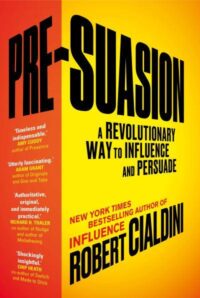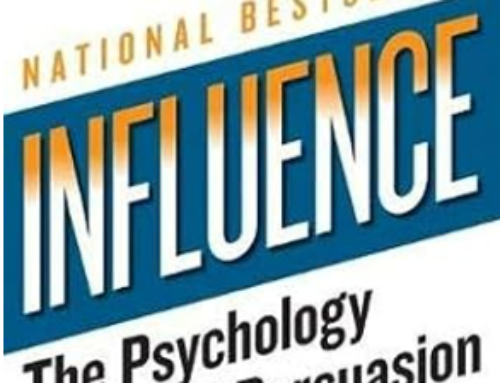Reading Notes for:


Metaphor Is a Meta-Door (to Change)
If you want to change the world, change the metaphor.
—Joseph Campbell
Suppose, for instance, that you are a political consultant who has been hired by a candidate for mayor of a nearby city to help her win an election in which a recent surge in crime is an important issue. In addition, suppose that this candidate and her party are known for their tough stance on crime
In any public pronouncements on the topic, she should portray the crime surge as a wild beast rampaging through the city that must be stopped. Why? Because to bring a wild beast under control, it’s necessary to catch and cage it. In the minds of her audiences, these natural associations to the proper handling of rampaging animals will transfer to the proper handling of crime and criminals.
Now imagine instead that the candidate and her party are known for a different approach to the problem: one that seeks to halt the growth of crime by treating its societal causes such as joblessness, lack of education, and poverty.
In all her public pronouncements on the topic, the candidate should portray the crime surge as a spreading virus infecting the city that must be stopped. Why? Because to bring a virus under control, it’s necessary to remove the unhealthy conditions that allow it to breed and spread.
Ben Feldman, sold more life insurance by himself than 1,500 of the 1,800 insurance agencies in the United States.
According to chroniclers of that success, he never pressured reluctant prospects into a sale. Instead, he employed a light (and enlightened) touch that led them smoothly toward a purchase. Mr. Feldman was a master of metaphor. In his portrayal of life’s end, for instance, people didn’t die, they “walked out” of life—a characterization that benefitted from associations to a breach in one’s family responsibilities that would need to be filled. He was then quick to depict life insurance as the (metaphorically aligned) solution: “When you walk out,” he would say, “your insurance money walks in.” When exposed to this metaphoric lesson in the moral responsibility of buying life insurance, many a customer straightened up and walked right.
For instance, in English and many other languages, the concept of weight—heaviness—is linked metaphorically to the concepts of seriousness, importance, and effort. For that reason, (1) raters reading a job candidate’s qualifications attached to a heavy (versus light) clipboard come to see the applicant as a more serious contender for the job; (2) raters reading a report attached to a heavy clipboard come to see the topic as more important; and (3) raters holding a heavy object (requiring more effort of them) put more effort into considering the pros and cons of an improvement project for their city. This set of findings raises the specter that manufacturers’ drive to make e-readers as light as possible will lessen the seeming value of the presented material, the perceived intellectual depth of its author, and the amount of energy readers will be willing to devote to its comprehension.
Comparable findings have appeared in studies of another arena of human judgment: personal warmth, where individuals who have held a warm object briefly—for example, a cup of hot (versus iced) coffee—immediately feel warmer toward, closer to, and more trusting of those around them. Hence, they become more giving and cooperative in the social interactions that follow shortly afterward.
For a fundamentally related reason, used-car salespeople are taught not to describe their cars as “used”—which links to notions of wear and tear—but to say “preowned,” which bridges to thoughts of possession and ownership.
During a flight: The scary-sounding “your final destination” is to be trimmed to “your destination,” and “terminal” is to be replaced with “gate” whenever possible.
The concept pre-loaded with associations most damaging to immediate assessments and future dealings is untrustworthiness, along with its concomitants, such as lying and cheating.
On the upside of things, though, the factor with most favorable impact in the realm of human evaluation is one we have encountered before: the self, which gains its power from a pair of sources. Not only does it draw and hold our attention with nearly electromagnetic strength, thereby enhancing perceived importance;
Therefore, anything that is self-connected (or can be made to seem self-connected) gets an immediate lift in our eyes.
People who learn that they have a birthday, birthplace, or first name in common come to like each other more, which leads to heightened cooperativeness and helpfulness toward each other. Potential customers are more willing to enroll in an exercise program if told they have the same date of birth as the personal trainer who’ll be providing the service.
Finally, researchers studying this general tendency to value entities linked to the self (called implicit egoism) have found that individuals prefer not just people but also commercial products—crackers, chocolates, and teas—with names that share letters of the alphabet with their own names. To take advantage of this affinity, in the summer of 2013 the British division of Coca-Cola replaced its own package branding with one or another of 150 of the most common first names in the United Kingdom—doing so on 100 million packs of their product! What could justify the expense? Similar programs in Australia and New Zealand had boosted sales significantly in those regions the year before. When finally tried in the United States, it produced the first increase in Coke sales in a decade.
When considering the persuasive implications of implicit egoism, there’s an important qualification to be taken into account. The overvalued self isn’t always the personal self. It can also be the social self—the one framed not by the characteristics of the individual but by the characteristics of that individual’s group. The conception of self as residing outside the individual and within a related social unit is particularly strong in some non-Western societies whose citizens have a special affinity for things that appear connected to a collectively constructed self.
In July 2007 the Afghan Taliban kidnapped twenty-one South Korean church-sponsored aid workers, holding them hostage and killing two as a savage initial
Kim replaced his head negotiator, whose appeals had been transmitted through an Afghan translator, with a South Korean representative who spoke fluent Pashtun.
According to Kim, who won the hostages’ swift release, “When our counterparts saw that our negotiator was speaking their language, Pashtun, they developed a kind of strong intimacy with us, and so the talks went well.”
“Easy” Does It.
There is much positivity associated with getting something with ease, but in a particular way. When we grasp something fluently —that is, we can picture or process it quickly and effortlessly—we not only like that thing more but also think it is more valid and worthwhile.
Researchers in the field of cognitive poetics have even found that the fluency-producing properties of rhyme lead to enhanced persuasion. The statement “Caution and measure will win you riches” is seen as more true when changed to “Caution and measure win you treasure.”
Tellingly, when people can process something with cognitive ease, they experience increased neuronal activity in the muscles of their face that produce a smile.
The harder an attorney’s name was to pronounce, the lower he or she stayed in the firm’s hierarchy.
When observers encounter hard-to-pronounce drugs or food additives; they become less favorable toward the products and their potential risks.
Research has revealed that the food detailed in difficult-to-process descriptions is seen as less tempting and that difficult-to-read claims are, in general, seen as less true.

